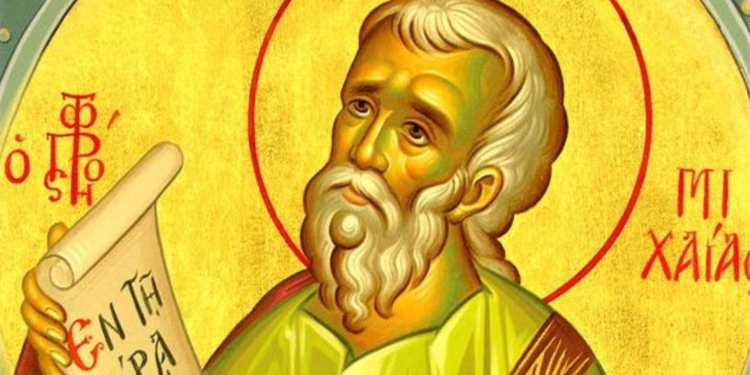The Prophet Micah, the sixth of the Twelve Minor Prophets, was descended from the Tribe of Judah and was a native of the city of Moresheth, to the south of Jerusalem. His prophetic service began around the year 778 before Christ and continued for almost 50 years under the kings of Judah: Jotham, Ahaz, and Righteous Hezekiah (721-691 B.C., August 28).
He was a contemporary of the Prophet Isaiah. His denunciations and predictions were in regard to the separate kingdoms of Judah and Israel. He foresaw the misfortunes threatening the kingdom of Israel before its destruction, and the sufferings of Judah during the incursions under the Assyrian emperor Sennacherib.
To him belongs a prophecy about the birth of the Savior of the world: “And thou, Bethlehem, house of Ephratha, art too few in number to be reckoned with the thousands of Judah; yet out of thee shall come forth to Me, one who is to be a ruler in Israel, and His goings forth were from the beginning, even from eternity” (Mic. 5: 2). From the words of the Prophet Jeremiah (Jer. 26: 18-19), the Jews evidently were afraid to kill the Prophet Micah. His relics were discovered in the fourth century after the Birth of Christ at Baraphsatia, through a revelation to the Bishop of Eleutheropolis, Zeuinos.
This Prophet (whose name means “who is like God?”), was a Morasthite from the land of Judah. He prophesied more than fifty years in the days of Joatham, Ahaz, and Hezekias, Kings of Judah. These kings reigned in the eighth century before Christ. From this it is clear that this Michaias is not the one who was the son of Iembla (or Imlah-III Kings 22:8), who censured Ahab and was murdered by Ahab’s son Joram, as the Synaxaristes says; for this Joram reigned the ninth century before Christ. Yet Michaias was still prophesying, as mentioned above, in the days of Hezekias, who was a contemporary of Hosea and Esaias, and of Hoshea, the last King of the ten tribes of Israel, when that kingdom was destroyed by Salmanasar (Shalmaneser), King of the Assyrians (IV Kings 17: 1 – 16; 18: 1). This Michaias is sixth in rank among the minor Prophets. His book of prophecy is divided into seven chapters; he prophesied that the Christ would be born in Bethlehem (Michaias 5: 2). In the reign of Saint Theodosius the Great, the holy relics of the Prophets Michaias and Abbacum were found through a divine revelation to Zebennus, Bishop of Eleutheropolis (Sozomen, Eccl. Hist., Book VII, 29).
Micah was of the tribe of Judah and from the village of Morasth, for which he is called the “Morasthite.” He was a contemporary of the prophets Isaiah, Amos, and Hosea, and of the Jewish kings Jotham, Ahaz and Hezekiah. Micah rebuked the people for their vices, and rebuked the false prophets who prophesied of wine and of strong drink (Micah 2:11). He foretold the destruction of Samaria. He also foretold the destruction of Jerusalem, which would come because its leaders accepted bribes, its priests taught for hire, and its prophets told fortunes for money. Therefore shall Zion for your sake be plowed as a field and Jerusalem shall become as heaps (Micah 3:12). But, of all his prophecies, the most important prophecy is that of Bethlehem as the place of the birth of the Messiah, Whose goings forth have been from of old, from everlasting (Micah 5:2).
It is not known exactly whether this prophet was slain by the Jews or whether he died a peaceful death. [Micah the Morasthite prophesied in the days of Hezekiah king of Judah and spoke to all the people of Judah saying, Thus said the Lord of hosts; Zion shall be plowed like a field and Jerusalem shall become heaps and the mountain of the house as the high places of a forest. Did Hezekiah king of Judah and all Judah put him at all to death? Did he not fear the Lord and besought the Lord and the Lord repented him of the evil which he had pronounced against them? Thus might we procure great evil against our souls] (Jeremiah 26:18-19). However, it is known that he was buried in his village. During the reign of Emperor Theodosius the Great, Bishop Zevin of Eleutheropolis had a mystical vision that led to the finding of Micah’s relics, together with those of the Prophet Habakkuk.














